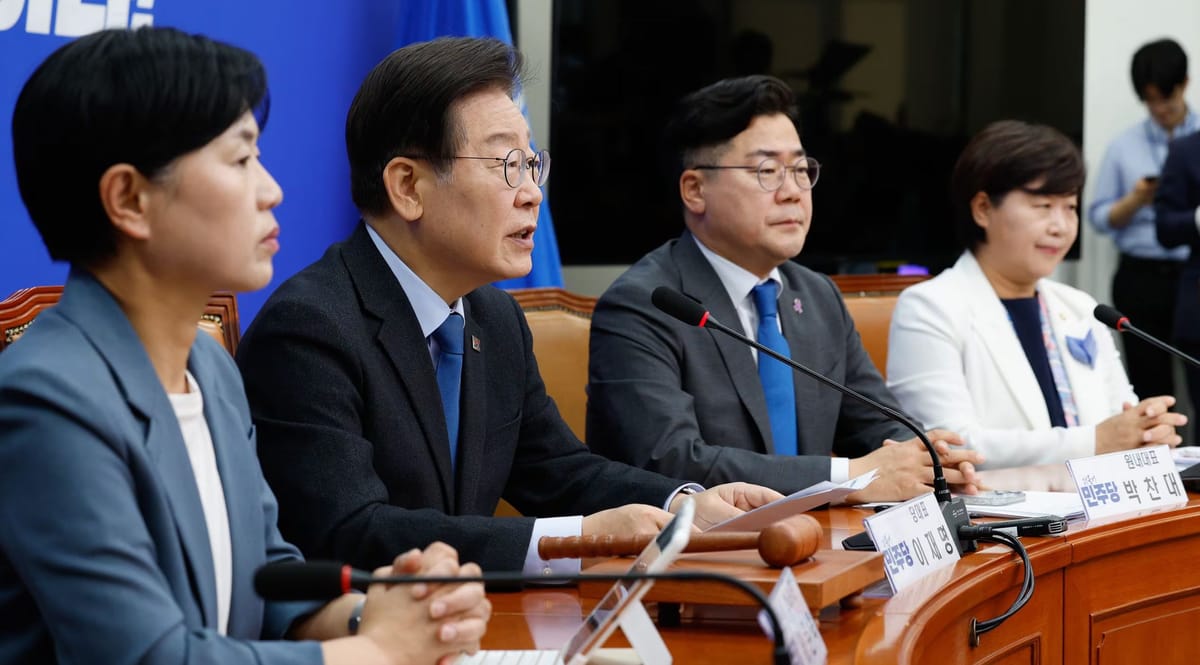DPK Amends Candidate Rules, Cadaver Controversy, South Korea's Early Heat Wave
Democratic Party Amends Constitution in Boost for Lee Jae-myung's Presidential Ambitions, Controversy Erupts Over Cadaver Lectures for Non-Medical Professionals, Record-Breaking Heat Wave Hits South Korea, Impacting Economy and Society

Democratic Party Amends Constitution in Boost for Lee Jae-myung's Presidential Ambitions
The Democratic Party has approved amendments to its party constitution and regulations that could pave the way for leader Lee Jae-myung's bid for the presidency in the next election. The changes, passed at a Supreme Council meeting on June 10th, include allowing an exception to the rule requiring the party leader to resign one year before the presidential election if there are "special and significant reasons" as determined by the party affairs committee. The amendments also include reflecting a 20% vote by party members in the election of the National Assembly speaker and floor leader, and abolishing a provision requiring the suspension of party officials who are indicted on corruption charges. The reforms are set to be finalized by the party's Central Committee on June 17th.
The amendments are widely seen as tailored to benefit Lee Jae-myung, who is currently facing multiple corruption investigations and trials. The party had previously added an exception allowing Lee to stay on as leader despite being indicted, and the new changes would allow him to run for president without resigning from the party leadership. This would enable Lee to lead the party through the 2026 local elections and control nominations, preserving his grip on the party apparatus and his front-runner status for the presidential nomination. The move is seen as a reflection of Lee's consolidation of power within the party following its landslide victory in the recent general election.
However, the amendments have drawn sharp criticism from both within and outside the party, with opponents blasting them as "custom-made" for Lee's political ambitions. The resignation exception based on vague "special circumstances" is seen as overly broad, and even some pro-Lee figures have argued that Lee should still resign early or not run for re-election to avoid the appearance of unfair advantage. The abolition of the mandatory suspension for indicted officials is also seen as primarily benefiting Lee, who faces the possibility of conviction in his trials. Critics argue that the top-down push for the amendments stifles internal party democracy and dissent, and reflects a lack of checks and balances on Lee's power.
Supporters of the reforms argue that they are necessary for stable party leadership and a shift towards "party-centered" governance. They contend that the current resignation requirement could leave the party leaderless ahead of major elections, and that the will of the party members who overwhelmingly back Lee should be respected. The mandatory indictment suspension is portrayed as unfair and a violation of due process, while expanding the role of party members in key decisions is framed as making the party more democratic. Proponents see the changes as a move away from factionalism and "bossism" towards a more coherent party identity and platform.
However, there are signs of growing intra-party dissent and calls for more debate before amending the constitution. Some lawmakers argue that the current rules are the result of long deliberation and consensus-building, and should not be overturned hastily. There are concerns that Lee's dominance and early lock on the nomination could lead to a backlash and exacerbate factionalism, and fears that the top-down push for amendments is stifling internal democracy. Rank-and-file party members and local chapters are demanding more input into the process, and there are questions over whether the general public supports the reforms.
The amendments are likely to have a significant impact on the broader political landscape and the dynamics of the next presidential race. They cement Lee Jae-myung's status as the presumptive Democratic Party nominee and his command over the party apparatus, potentially accelerating the primary timeline and discouraging potential challengers. The reforms are also likely to intensify legal and political scrutiny from the opposition over Lee's corruption cases, and shift the focus of the presidential race to a referendum on Lee rather than an open contest of ideas. How the changes will impact voter sentiment and the party's ability to appeal beyond its base remains to be seen.
The controversy over the amendments reflects larger debates in South Korea between empowering rank-and-file party members and the need for stable and effective leadership, as well as between the presumption of innocence and holding officials to higher ethical standards. The case raises questions about the role of parties in aggregating interests and structuring political competition versus serving as personalistic vehicles for individual ambitions. There are also concerns over whether Korean parties are sufficiently institutionalized and internally democratic, and how party-centered governance relates to the broader quality of democracy and representation in the country.
Controversy Erupts Over Cadaver Lectures for Non-Medical Professionals
A controversy has erupted after it was revealed that one of South Korea's top medical schools, Catholic University Medical School, has been providing paid cadaver lectures to non-medical professionals such as fitness trainers and exercise leaders. The lectures, conducted by a current anatomist at the school's Applied Anatomy Research Institute, were held last year and used "fresh cadavers," with participants paying a fee of 600,000 won per session. The lectures were promoted by a private company that provides training for fitness instructors, raising questions about the commercialization of donated bodies.